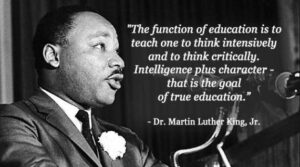January 16, 2017
MLK and the importance of diversity education
It’s humbling to reflect on Martin Luther King, Jr., today, because although we’ve made some steps forward since he was a civil rights leader and activist in this country, lighting a fire for equality and fighting tooth and nail for equal rights for all, we still have a very long ways to go.
The fact of the matter is that rights are not equal in this country. They are not equal across gender lines, different ethnicities, or sexual orientation. And that just can’t be.
As parents of little ones, we face an enormous responsibility — raising human beings in a very challenged country, and teaching them everything they need to know to be empowered, active, positive forces in our world.
And that includes diversity. No matter what ethnicity you are, it is all our responsibility to learn, be aware, promote knowledge, knock down stereotypes, stand up for equality, fight for the marginalized, and ensure that our language and actions do not alienate others.
Teaching our children that people are different, and that the world is filled with unique cultures, perspectives, skin tones, languages, and customs is an enormous task, but simple actions go a long way.
Here are a few tips:
- Teach your children about diversity by exposing them to diversity. It’s very easy to live in a homogenous world, where the people, food, and culture are all the same and we’re not as exposed to individuals of other races and lifestyles. You can do this on a more micro-level, by eating diverse foods, reading books, and watching films that depict and teach about other cultures. But the most important step is getting out there and actually existing in the world around people who are not like you. Have conversations, ask questions, learn, be present.
- Model the correct behavior. It all starts in the home. Your kids will pick up on everything you do, including how you talk about other people and cultures, whether or not you have friends from other cultures, and how you feel about and treat diversity. Think about that every time you say or do something — you are your child’s greatest education, and have the power to lead by example in everything you do.
- Encourage them to ask questions. When you’re new to the world, and learning about all the diversity it contains, you’re going to have questions! Political correctness is good to a point. If your child asks about someone else’s skin color, or why someone does, wears, or acts in a way that seems unusual or different to them, don’t shush them! These are perfectly honest questions and ideal teaching moments. Shushing them encourages the notion that these questions are bad, and plants the seed for certain stigmas to grow. Encourage the questions. Have the conversations.
- Say no to stereotypes. They’re dangerous, harmful, and should not be part of how your child perceives other cultures. If you hear them exploring stereotypes or questioning them, use that moment to set the record straight. Stereotypes help exactly no one.
We’d love to know how you and your family have incorporated more diversity education into your lives. Share your favorite tips, tricks, and techniques in the comments!

